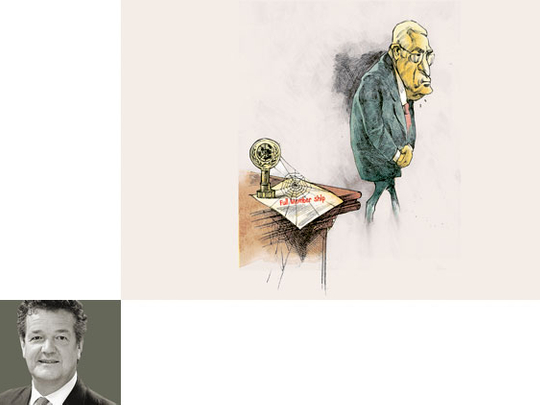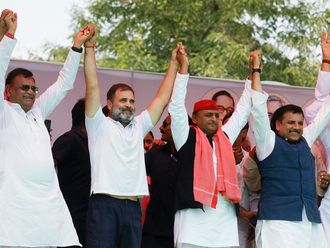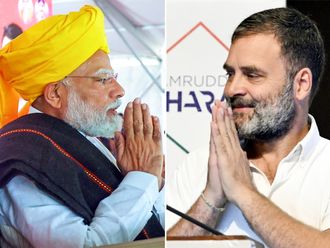
After the drama of Mahmoud Abbas' presentation of the Palestinian demand to join the United Nations as a full member, almost total silence has fallen. We assume that there is lots of lobbying going on behind closed doors, although we assume that the United States will veto the proposal. We also assume that the State Department is working hard to find an alternative to a flat ‘no', since that would be an embarrassing vote against their own president's clear statement that Palestinian statehood is a vital security issue for the United States. It may seek to raise the Palestinians from being an observer entity (as they are at present) to being non-member state (like the Vatican, Taiwan and Kosovo) although not to full membership.
But all these assumptions might be wrong. The Palestinian leadership may have made their dramatic gesture of seeking full membership in the knowledge that nothing would happen. The startling silence backs this interpretation of events. There is very little public diplomacy happening, and there are no marches in the streets of Arab capitals. The case for Palestinian statehood has not become a popular cause. Abbas is not touring the region looking for active support. The Arab nations have not fanned out across the world to cajole or threaten anyone resisting the proposal. It may be that the Arabs assume that the argument for recognition of the Palestinian state by the United Nations is a foregone conclusion, and it is so obvious that there is no need to shout about it.
But some of the reasons for why Abbas took the Palestinian case to the United Nations at this time will not inspire popular Arab support, since he was working to reinforce his own position. The various attempts to conduct direct negotiations with Netanyahu's government had failed, and the removal of Hosni Mubarak, a long-term Fatah ally, in Egypt's revolution triggered a massive rethink by the Palestinians in Ramallah. They knew that they had lost their most important friend, and the status quo could not continue. By May, they had reached a reconciliation with Hamas, and even if it has yet to be finalised the appearance of unity has allowed Abbas to go to the UN.
Under pressure
But Abbas is also under pressure from his own people. Exactly the same generation that toppled Mubarak is there in Palestine, and they see a president hanging on to power long after his term expired in 2009, following a policy of seeking negotiated peace with an Israeli government that does not want to negotiate and is determined to impose its own answers on the West Bank. Like the whole of the Arab world, the young people of Palestine were very excited by Obama's victory, but they now feel deeply betrayed by his refusal to rein in Netanyahu.
If Abbas was to keep any credibility with the twenty-something Palestinians, whose numbers will determine his political future, he had to come up with something new. Abbas is firmly of the previous generation, and his political credibility is based on his role in the Palestinians' struggle. The young Palestinians want something more up to date, and splitting Palestine, dodging elections, ruling by decree, and refusing to call a parliament which last met in 2007 is not the answer.
Therefore going to the United Nations re-invigorates credibility with his own people, who see him taking a clear stand after all these years of trying to talk to the Israelis and Americans. The process at the UN will not make much difference on the ground, but it has forced the Israelis into a new dialogue which is not of their choosing. The Palestinians have regained some initiative.
But Abbas is a very canny politician. He may have got a reconciliation deal with Hamas, but that is focused on a new arrangement of the government in Palestine. Pressure from the United States may well keep Hamas out of any future Palestinian government, but instead a more technocratic government might work with Hamas support. But the relationship with the United Nations is not handled by the Palestinian National Authority (PNA). It is handled by the historic Palestinian Liberation Organisation (PLO), of which Hamas is not a member. So Abbas keeps control of the UN talks, while also getting some movement on reconciliation.
But this kind of arcane deal-making, and curious institutional confusion between the PNA (running the West Bank at present, and maybe all of Palestine after reconciliation with Hamas) and the PLO (talking to the UN) will not bring about peace. It may give Abbas a few more years of power and greater immediate authority, but the key is not the complex structure of Palestinian power, but the willingness of the Americans to engage. This is lacking, and Netanyahu knows this.
So does Hamas and so do the young people of Palestine, who have seen what their fellows have done in Egypt. So the current silence around the UN demand may not be constructive. It may well be due to people thinking that it makes very little difference on the ground, and simply reinforces Abbas' personal authority, while the real struggle should be on the streets of the West Bank.










